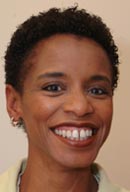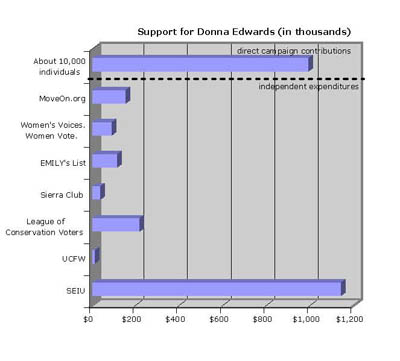 |
|||||
| Politics | Business | Schools | Justice | Health | Et Cetera |
By Veena Trehan "Three thousand, nine hundred and ninety lives later, five years later, nearly 30,000 injuries later, untold psychological damage to families and service members later," Edwards said, yards from the White House. "It's time to end the lies, to end the deceit, to end the money and to end the war." Edwards' March 19 speech at the "Iraq Campaign 2008"-sponsored event was in some ways unsurprising, given her early opposition to the war and her repeated calls to withdraw troops. But that speech also promoted a key goal of vocal war opponents MoveOn.org and the Service Employees International Union, two organizations part of "Iraq Campaign 2008" that spent $1.3 million to support her candidacy, according to a Capital News Service analysis. And those kinds of large expenditures -- though made independent of the campaign -- make election finance critics wonder how independent Edwards can be from the organizations who contributed heavily to her. About 10,000 individuals contributed a little under $1 million directly to Edwards' campaign. In contrast, just eight progressive national groups spent more than $1.7 million to help her. These big spenders now have a big "in" to discuss their political agenda with Edwards, said Stephen Weissman, associate director for policy of the Campaign Finance Institute. "They will have a strong claim to access," he said. Campaign finance laws limit individual donations to congressional candidates to $2,300 and political action committees to $5,000 per election. But spending not coordinated with the campaign -- independent expenditures -- is unlimited and often a key tool to further the agendas of political action committees and so-called 527 organizations, named for the section of tax code under which they're organized. These groups pour millions into pointed attack ads and extensive canvassing efforts. Edwards' independent backers include two political action committees for the progressive labor union giant, the Service Employees International Union, which collectively spent $1.1 million to help elect her, and the political arm of another union, the United Food and Commercial Workers, which spent about $10,000. Two groups that work to boost female voter turnout and/or promote women candidates -- EMILY's List and the "Women's Voices. Women Vote. Action Fund" -- together spent $199,000. Organizations with an environmental agenda -- the League of Conservation Votes Inc. and the Sierra Club Political Committee -- spent another $250,000, and the progressive powerhouse MoveOn.org directed $111,000 toward television ads on Edwards' behalf. Wynn's direct, regulated fundraising topped Edwards' by $430,000 through March 31, according to Federal Election Commission records, but independent expenditures on his behalf lagged far behind, with just $309,000 spent by the National Association of Realtors. Edwards' eight groups blitzed residents with mail, calls, knocks and ads reminding them of Wynn's "bad votes" -- the war, billions in energy company tax subsidies and stricter bankruptcy standards. More than $1.2 million in independent expenditures was dumped into Edwards' race in the last month before the eight-term congressman's crushing 22-point defeat. "That much money, no matter where it comes from, influences the basics of democracy," said Ryan O'Donnell, executive director of Common Cause Maryland. "No matter (the) side, you wonder if the money has strings attached." It doesn't, said Edwards. The money was not given to influence future votes, but because she and the groups share the same philosophy, as demonstrated by her 20-plus-year history working with women's, environmental and progressive organizations. Nevertheless, money's influence will be felt, said political science professor Michael Cain.
"It's very difficult to find it influencing individual votes," said Cain, director of the Center for the Study of Democracy at St. Mary's College of Maryland. Rather, it influences legislation by shaping bill frameworks, content and amendments. If, as expected, Edwards wins the 4th Congressional District seat in the special election slated for June 17, she'll work with a Congress that will likely be more focused on progressive priorities like health care reform and global warming. To understand the issues, Edwards is already finding like-minded national supporters helpful. "I rely on the breadth of expertise in a lot of these organizations," said Edwards, executive director of seven years for the progressive Arca Foundation. "And I will continue to do that in the United States Congress." SEIU is a likely source of information. The 1.9-million-member organization canvassed voters and ran ads, including one that placed Wynn on a slot machine to show how he "hit the jackpot" of corporate donations, luxury lobbying trips, and salary increases with his election to Congress. The fast-growing union - that supports affordable and universal health care, better wages and a path to citizenship for illegal workers - has "strong shared values" with Edwards, according to SEIU 1199 Political Director Ebs Burnough. The spending on Edwards' race matches the first goal of labor unions, said University of Maryland political science professor Paul Herrnson, to get more -- or in this case, more sympathetic -- Democrats in Congress. A second goal is to support Democrats in leadership positions, he said. And while Edwards is only a prospective freshman legislator, she already is championing a cause important to the organization -- the Iraq war. SEIU President Andy Stern opposed the war before it started and has since led labor unions in advocating its end. Edwards has been in lock step, speaking at the March rally and promoting "A Responsible Plan to End the War in Iraq." Along with Darcy Burner, she's been one of the most highly visible of the 50 congressional candidates who signed the comprehensive plan calling for greater diplomacy, an immediate drawdown of troops and reduced American oil dependence. The goals are a little different for women's and environmental groups, Herrnson said. "What they're concerned about is electing someone who shares their view of the issues, who will be a champion of those issues without having to go and twist arms," he said. While Wynn's environmental voting record since he eked out a victory over Edwards in 2006 rated a 100 percent on a congressional scorecard, his career record disappointed the League of Conservation Voters. LCV spokesman David Sandretti cited Wynn's vote for the 2005 energy bill and his ineffective use of his chairmanship of the Environment and Hazardous Materials House Subcommittee. "Frankly, in that district, we feel like we deserve better," said Sandretti, of an area represented by a Democratic member of Congress for 20 years. So the League spent $214,000 to promote Edwards and its energy policies. Looking forward, the League expects Edwards to strongly support clean renewable energy sources and push for development of more efficient cars, factories and homes. "In Donna Edwards we're going to have a real leader in the fight to stop global warming," Sandretti said. EMILY's List may have played a larger role in Edward's victory than its contributions would seem to warrant. When the group took the unusual step of endorsing a primary candidate, they brought Edwards media coverage and funding. "EMILY's List gets out there early. That makes a victory like Edwards' victory a possibility," said Herrnson. The List followed its Nov. 5 endorsement with $111,000 in get-out-the-vote efforts. On April 13, Edwards held a victory party in a crowded, back room of Jackie's Restaurant in Silver Spring. Edwards asked hundreds of supporters to hold her accountable for her decisions. Jubilant individuals brushed away suggestions that the groups making independent expenditures would gain undue influence, expressing confidence in her track record, priorities and judgment. "I'm sure that there's going to be times that we're not going to be on the same side," said Silver Spring resident Win Allred, a former Small Business Administration staffer who held two large barbeques for Edwards. "But I'm also sure she'll tell why she's done what she's done." In fact, the largest lesson from Edwards' financing success may not be for constituents, but for congressmen. Cain said her race shows the power of these groups. "It signals to other Democrats they have to be careful if they are in a tight district or tight race -- and not cross swords with some of these large national organizations."
|
||||||||||
|
Copyright © 2008 University of Maryland Philip Merrill College of Journalism | ||||||||||
| Politics | Business | Schools | Justice | Health | Et Cetera | |||||

